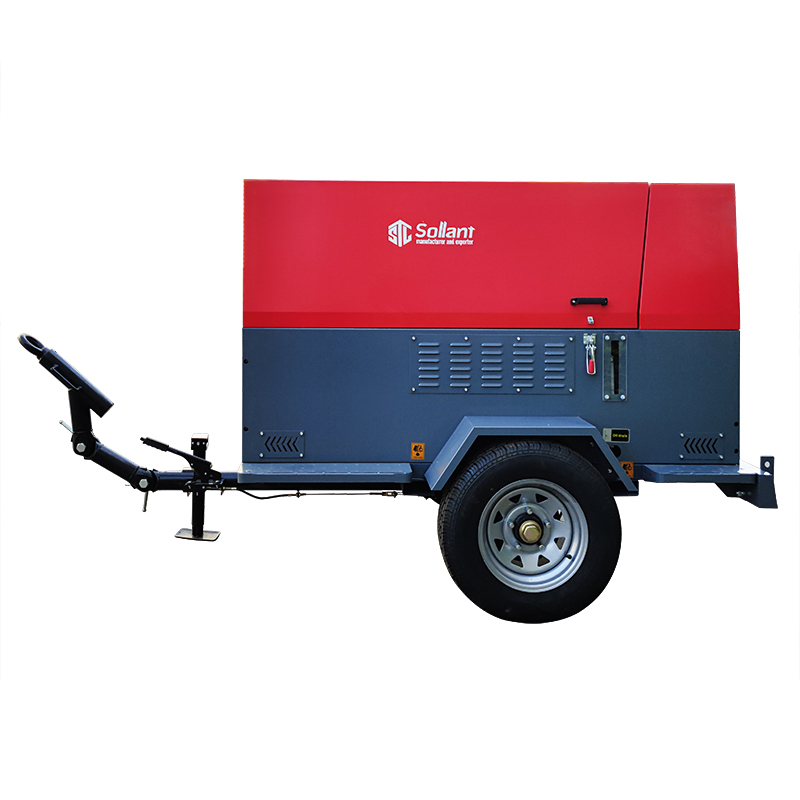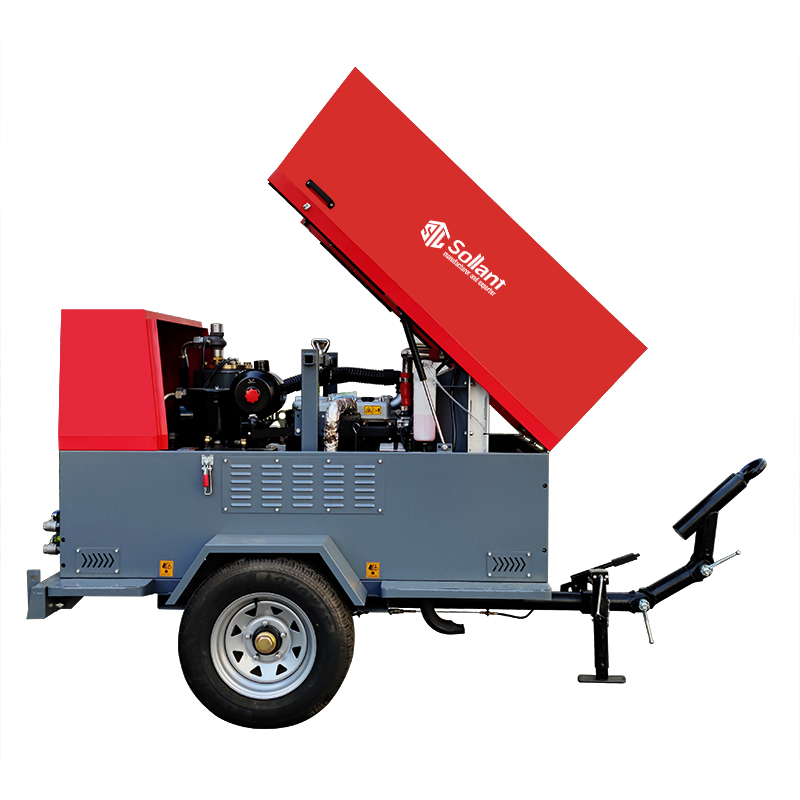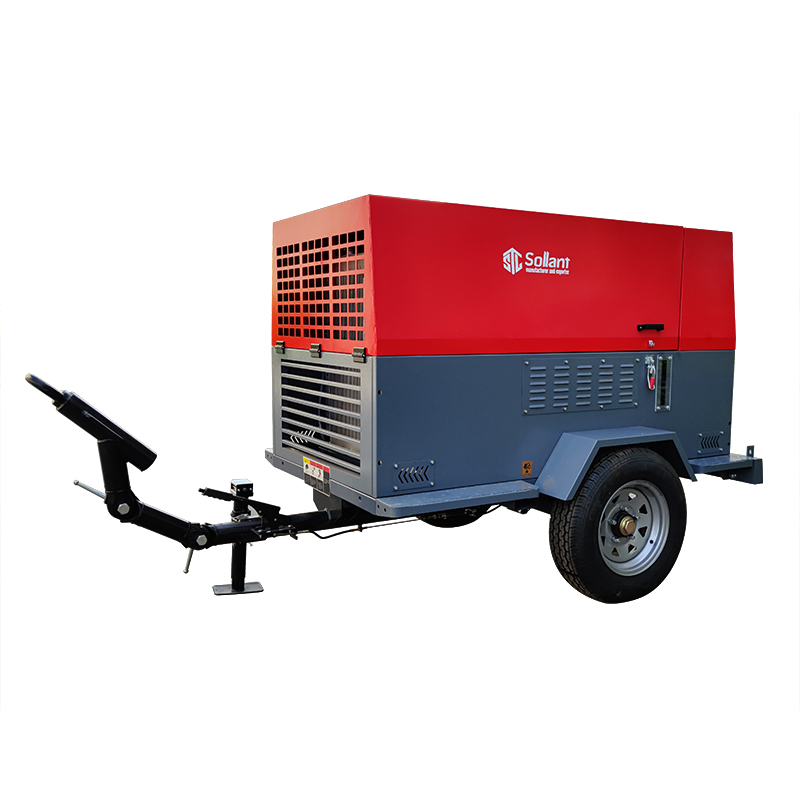How to Efficiently Use a 39kW Diesel Mobile Air Compressor

Diesel mobile air compressors, particularly the 39kW models, are essential pieces of equipment in industries such as construction, mining, and roadwork, where a reliable and powerful source of compressed air is required. Efficient use of a 39kW diesel mobile air compressor not only improves performance but also extends the lifespan of the machine and reduces operational costs. In this article, we will discuss how to effectively use a 39kW diesel air compressor, highlighting key tips for maximizing efficiency.
1. Proper Setup and Site Preparation
Before starting the 39kW diesel air compressor, ensure that the location is level, well-ventilated, and free from potential hazards such as debris or excessive moisture. A stable and clean site ensures the compressor runs smoothly and safely. Make sure that the air intake is not blocked by dust or dirt, which can reduce the efficiency of the compressor by limiting airflow.
2. Regular Maintenance for Optimal Performance
Routine maintenance is critical for any air compressor. Check oil levels, air filters, and fuel filters regularly. Keeping the filters clean helps prevent contamination in the compressed air and ensures the engine runs efficiently. Routine inspections of belts, hoses, and connections should be performed to avoid unexpected breakdowns during operation. A well-maintained 39kW diesel compressor will consume less fuel and deliver consistent air pressure, improving overall productivity.
3. Operating the Compressor at Optimal Load
Running a 39kW diesel mobile air compressor at its optimal load ensures efficient fuel consumption and better performance. Operating the compressor at a significantly lower or higher load than it’s designed for can lead to excessive wear and tear, decreased performance, and higher fuel consumption. It’s best to match the air demand of the tools or equipment being powered to the compressor’s output capacity.
4. Monitor Fuel Consumption
Fuel efficiency is crucial in diesel compressors, especially in remote job sites where refueling can be challenging. To maximize fuel efficiency, avoid excessive idling, and ensure the engine is operating at the recommended RPMs. By optimizing the fuel usage of the 39kW diesel compressor, operational costs can be reduced significantly.
5. Proper Use of Pneumatic Tools
Ensuring that all pneumatic tools connected to the 39kW air compressor are properly maintained and functioning efficiently is another key factor in maximizing the compressor’s performance. Leaky hoses, poorly maintained tools, or incorrect fittings can lead to pressure loss, which forces the compressor to work harder. Always inspect tools and connections for any signs of wear or leaks.
6. Manage Air Pressure and Flow
Setting the correct air pressure is vital for ensuring that your compressor operates efficiently. Avoid over-pressurizing the system, as this can result in wasted energy and increased fuel consumption. Use a pressure regulator to control and monitor air pressure, adjusting it based on the requirements of the job or tools being used.
7. Transportation and Mobility Considerations
One of the main advantages of a 39kW diesel mobile air compressor is its portability. When transporting the compressor, ensure that it is properly secured to prevent any damage during transit. Always ensure the unit is turned off and depressurized before moving it. Efficiently moving the compressor between job sites can save time and ensure continuous productivity.
8. Consider Environmental Factors
Diesel compressors are often used outdoors, meaning environmental factors such as extreme temperatures, humidity, and dust can affect performance. In hot climates, ensure that the engine is not overheating and that proper cooling measures are in place. Cold weather can also impact diesel engines, so preheating the engine or using cold-start features can ensure smoother operation in low temperatures.
9. Leverage Automation and Monitoring Tools
Modern 39kW diesel air compressors come equipped with advanced control panels and monitoring systems. Use these features to track key metrics like fuel consumption, operating hours, and air pressure. Automated shut-off features can prevent overuse and save energy. Remote monitoring tools allow operators to track the performance and status of the compressor, providing insights that can be used to improve efficiency.
10. Follow Manufacturer Guidelines
Always adhere to the manufacturer’s instructions regarding the use and maintenance of the 39kW diesel mobile air compressor. Proper care and adherence to recommended service schedules can extend the life of the compressor and maintain optimal performance. Each model has specific requirements, so consulting the manual for details on operating conditions and limitations is essential.
Conclusion
A 39kW diesel mobile air compressor is a powerful and versatile tool used across various industries. By following the best practices outlined above—such as regular maintenance, optimizing load, managing fuel consumption, and using pneumatic tools effectively—you can maximize the efficiency and lifespan of your compressor. Implementing these strategies will help reduce operational costs, enhance performance, and ensure reliable, continuous use on job sites.
How to Use Industrial Air Compressors: A Comprehensive Guide





